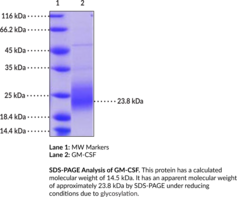Territorial Availability: Available through Bertin Technologies only in France
- Correlated keywords
- GMCSF CSF 2 antiparallel IL1 TNF? IL12 antiinflammatory IL10 IFN? IL1? CIA proinflammatory Ala 18 SDSPAGE
- Product Overview:
Granulocyte-macrophage colony-stimulating factor (GM-CSF) is a secreted glycoprotein encoded by the CSF2 gene in humans that promotes the differentiation, proliferation, and function of a variety of progenitor or mature cells.{56075,56076} GM-CSF exists as a secreted, disulfide-linked monomer and is composed of four ?-helices and two anti-parallel ?-sheets that contain numerous glycosylation sites.{56076} GM-CSF production is induced in a variety of cells, including macrophages, T cells, neutrophils, and dendritic cells, by stimulation with pro-inflammatory cytokines, such as IL-1, TNF-?, or IL-12, and is decreased by cell stimulation with the anti-inflammatory cytokines IL-10 or IFN-?.{53779} Binding of GM-CSF to the GM-CSF receptor, which is highly expressed on dendritic cells and their precursors, macrophages, and monocytes, promotes cell differentiation, proliferation, and survival and enhances several immunological functions, including chemotaxis, cytokine signaling, phagocytosis, antigen presentation, and pathogen killing.{56075,56077} GM-CSF-deficient mice exhibit increased accumulation of pulmonary surfactant and protein and have been used as a model of pulmonary alveolar proteinosis.{56078} Neutralization of GM-CSF with a monoclonal antibody decreases joint cartilage destruction and TNF-? and IL-1? levels in a mouse model of collagen-induced arthritis.{56079} GM-CSF has been used to generate bone marrow-derived macrophages with a pro-inflammatory phenotype in vitro.{53779} Formulations containing GM-CSF have been used for myeloid cell reconstitution following chemotherapy. Cayman’s GM-CSF (human, recombinant) protein can be used for cell-based assay applications. This protein consists of 127 amino acids, has a calculated molecular weight of 14.5 kDa, and a predicted N-terminus of Ala18 after signal peptide cleavage. By SDS-PAGE, under reducing conditions, the apparent molecular mass of the protein is approximately 23.8 kDa due to glycosylation.
Cayman Chemical’s mission is to help make research possible by supplying scientists worldwide with the basic research tools necessary for advancing human and animal health. Our utmost commitment to healthcare researchers is to offer the highest quality products with an affordable pricing policy.
Our scientists are experts in the synthesis, purification, and characterization of biochemicals ranging from small drug-like heterocycles to complex biolipids, fatty acids, and many others. We are also highly skilled in all aspects of assay and antibody development, protein expression, crystallization, and structure determination.
Over the past thirty years, Cayman developed a deep knowledge base in lipid biochemistry, including research involving the arachidonic acid cascade, inositol phosphates, and cannabinoids. This knowledge enabled the production of reagents of exceptional quality for cancer, oxidative injury, epigenetics, neuroscience, inflammation, metabolism, and many additional lines of research.
Our organic and analytical chemists specialize in the rapid development of manufacturing processes and analytical methods to carry out clinical and commercial GMP-API production. Pre-clinical drug discovery efforts are currently underway in the areas of bone restoration and repair, muscular dystrophy, oncology, and inflammation. A separate group of Ph.D.-level scientists are dedicated to offering Hit-to-Lead Discovery and Profiling Services for epigenetic targets. Our knowledgeable chemists can be contracted to perform complete sample analysis for analytes measured by the majority of our assays. We also offer a wide range of analytical services using LC-MS/MS, HPLC, GC, and many other techniques.
Accreditations
ISO/IEC 17025:2005
ISO Guide 34:2009
Cayman is a leader in the field of emerging drugs of abuse, providing high-purity Schedule I-V Controlled Substances to federally-licensed laboratories and qualified academic research institutions for forensic analyses. We are certified by ACLASS Accreditation Services with dual accreditation to ISO/IEC 17025:2005 and ISO Guide 34:2009.





